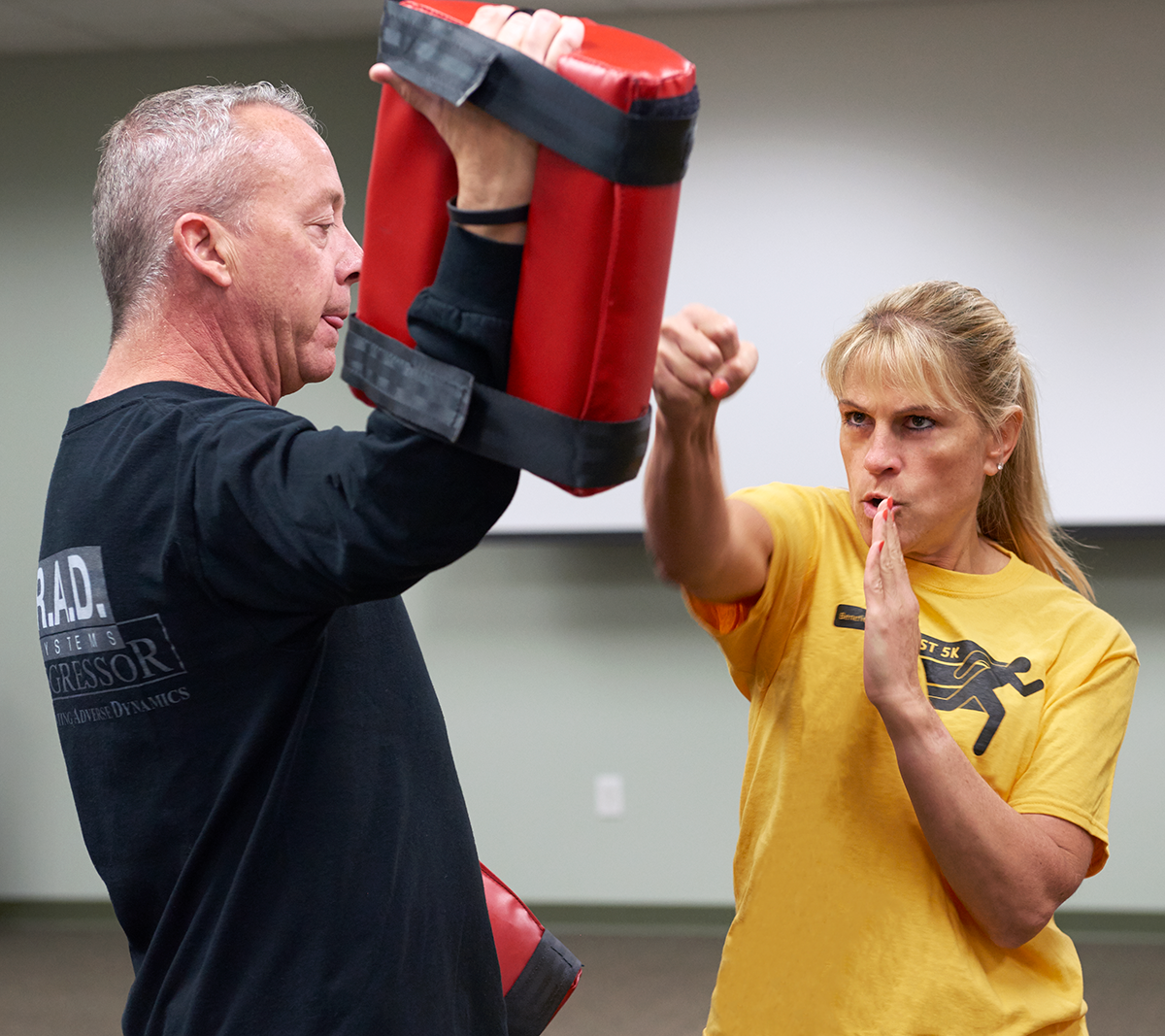

New Jersey resident Tracy used to live in fear. She came close to being one more woman among a staggering number who are victims of serious violence. The reality is sobering: every nine seconds in America a woman is assaulted or beaten. Tracy’s near-miss experience was just one of many variations on the theme, which could involve harassment by a stranger at a bar, violence at the hands of a partner, or an attempted mugging in a parking lot, among other examples both numerous and familiar.
“When I was in my 20s, I was put in a corner and I had nowhere to go,” Tracy says. “Nothing serious happened, but it could have. I got away.”
Violence against women continues to be a pervasive problem in the United States and all around the world. One in four women in the U.S. have experienced intimate partner violence, according to the Centers for Disease Control and Prevention. And the Justice Department estimates that one in five women have been sexually assaulted during their college years. Younger and low-income women and some individuals who are members of marginalized groups are particularly vulnerable to such attacks. With the COVID-19 pandemic, stay-at-home orders and school closures had the potential to impact household stresses — leading to what the United Nations has described as a “shadow pandemic” of violence against women.
To gain control over their personal safety, many women turn to R.A.D. (Rape Aggression Defense), a nationally recognized program that teaches realistic self-defense tactics and techniques.
In 2019, Tracy decided she needed to be one of them. Positive word-of-mouth about the course through Penn Medicine Princeton Health led her there, but, like many first timers, she felt nervous and intimidated, not knowing what to expect. Questions ran through her mind: What are they going to have us do? Will it be too hard? Can I do the moves?
“When you first do it, they tell you your voice is your most powerful weapon. ‘No!’ they tell you to yell,” Tracy says. “But in the beginning, you feel funny shouting out loud every time you do a strike. I was a little timid.”
It wouldn’t take long for those shy feelings to morph into empowerment.
Over the last 30 years, more than 1 million women have taken the course — including Deborah Millar, the director of community wellness and engagement for Princeton Health. “I said, ‘Oh, this is phenomenal. We have to bring this to the hospital.’”
So she approached Princeton’s foundation for initial funding to recruit and train instructors and made it happen. Since it started 15 years ago, more than 1,100 women have been trained through Princeton Health. Millar and 12 others serve as instructors for the course, which is broken down into four sessions, three hours at a time.

Deborah Millar demonstrates self-defense moves as part of the R.A.D. class for women at Penn Medicine Princeton Health.
“We start by going through the risks — risk awareness, reduction, avoidance, and recognition — because those four risk factors are 90 percent of self-defense,” Millar says. “We go through safety outside of the home; safety when you are in elevators; safety in driving — all kinds of things you should pay attention to.”
The next sessions teach the women different physical techniques before moving onto the final day of simulations, when they have the opportunity to practice their newly learned techniques on “aggressors” wearing special protective equipment in realistic training scenarios.
By the time Tracy made it to those simulations, so much had already changed. Confidence was surging through her. She felt educated with new ways to defend herself. And, most importantly, she says, the course made her think smarter when she’s navigating the world — getting money at an ATM or parking her car in the lot of department store, for instance.
Recalling the scary incident from her 20s, she says, “I would have used the techniques that I learned in that class. It teaches you to be aware of your surroundings and protect yourself in a dangerous situation when certain things come up.”
Classes attract women of all different ages, backgrounds, and ethnicities, Millar says. Mother-daughter pairs show up, too.
“It’s nice because the daughters get to see that the moms can do it,” Millar says, “and then the moms will have peace of mind knowing that the daughters know it before they go off to college.”
For many years, Princeton offered the course four times a year, but in 2018 it started to become more popular, right around the time the #MeToo movement began drawing more attention to violence and sexual assault against women. In the year preceding the COVID-19 pandemic, Millar and the other instructors conducted the trainings 13 times, and with more women in each of the courses.
Women of all fitness levels join the training course, and no experience is required to participate. Once women complete the class, they’re allowed to return anywhere the class is offered at no cost for the rest of their lives. It’s priced at $35 at Princeton to keep it affordable.
Based on the program’s continued success and high interest, Millar and Craig Harley, associate director of Community Wellness at Princeton Health, went through an extensive training process with RAD Systems in 2021 to become instructor trainers for the Basic Physical Defense for Women course — so now they can teach others who wish to become instructors. Their first instructor class in February 2022 attracted enrollees from the Princeton Health staff, local law enforcement, and some attending from as far as Virginia, to learn how to help more women to protect themselves from the risk of violence.
Research shows self-defense classes for women can make a difference. Women who participated, according to studies in the journals Violence Against Women and the New England Journal of Medicine, were up to 50 percent less likely to be sexually assaulted a year after the class than women who didn’t take a class. They were also more confident in their ability to resist an assault.
For women like Tracy who have had brushes with potential or actual violence in the past, the classes can help them find empowerment and the strength to find additional supports to heal.
Millar recalls one recent incident: In the final session, participants are able to opt out of the simulated assault practice with their instructors if they prefer not to for any reason, and some do. This time, one young woman asked to speak with Millar afterward. “I wanted you to know the reason was that, a few weeks before this class started, I was raped,” Millar recalls the woman told her. “That’s why I’m here.”
The participant was able to connect with Princeton House Behavioral Health for ongoing professional support in the aftermath of her assault, with Millar’s help. But she also remarked on the impact she’d already felt from the self-defense program: “I have my power back.”
“By the end of the class, everybody had no problem using their voices,” Tracy says. “You walk out of there and feel like a warrior.”







